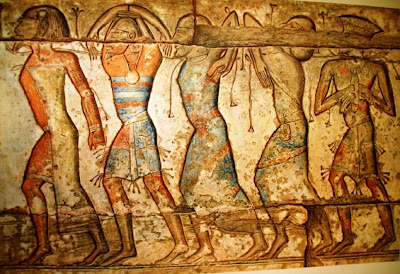Suspended Waters, Suspending Disbelief - Torah portion Beshalach
 |
| Visual development art from “The Prince of Egypt” |
But what does that mean then for evaluating Biblical narratives like the Parting of the Red Sea? Well, as enamored as I am of skepticism, it occurs to me that it's hopelessly out of place here. It's the wrong paradigm, the wrong set of glasses to be looking through. Because it views the Red Sea episode first and foremost as a "claim" to be scrutinized, instead of a narrative to immerse oneself in, to visualize, experience, and comprehend for its content.
Here I am ready to get into the story...
A nation enslaved. A Pharaoh so obsessed with maintaining the subjugation that he lets his own nation absorb blow after destructive blow and refuses to release his grip. He finally relents just long enough for the fledgling Israelite nation to escape. But Pharaoh and his army are soon in hot pursuit. The Israelites find themselves trapped, the Red Sea dead ahead, and Pharaoh's army behind them. Then just when it looks like the end for Israel, Moses raises his staff, and God dispatches a wind that cuts the sea clear in half. The seawater stands like a wall on two sides, creating a corridor of dry earth in between, which the Israelites follow to safety. The Egyptian army gives chase, but Moses once again stretches out his staff. The gravity-defying waters come crashing down, the weight of the sea destroying Israel's oppressors...Saved at the very last moment! Water suspended in mid-air! The weak triumphs over the mighty. Good over evil. Several millennia later, it's no less of an epic story. Maybe even worthy of a movie or two...
That's what I want to think about when I get to the Red Sea episode. I want to immerse myself in the story - the vivid imagery, the rich tapestry of themes and ideas. I want to check my skepticism at the door, suspend my disbelief, and just go with it. And yet I find this exceedingly difficult to do. Why? Because of all the energy, the "noise," around the question: Did the Red Sea really split? The noise comes from every angle - from believers focusing on the historicity of the miracle, to skeptics reflexively rebuffing it, to rationalist in-betweeners positing that a strong enough east wind could have formed a temporary land bridge, thereby allowing the Israelites to cross the sea, etc.
Now imagine for a moment that you're in a theater watching a Superman movie. Half the audience is talking about it being a documentary about Kal-El the Kryptonian. The others are either calling the documentary folks nuts, or they're proposing theories about how Superman could fly without defying the laws of physics if in fact he utilized the Jet Stream. As for me, I'm thinking: Hey guys, I'm trying to get into the movie here! Would you please cut the chatter??
No, I'm not comparing the Torah to Superman. I'm not making claims of fact vs. fiction. In fact I'm suggesting that we leave those kinds of questions aside. I fully recognize that this is hard to manage in a world where we're incessantly fact-checking and myth-busting, where we have to worry about fake news and the proliferation of outright lies. We've grown enormously sensitive to the idea we're being deliberately duped, misled.
The reason I referenced Superman is to remind us of a different kind of mental space we can enter, where we're not so concerned with claims and counter-claims, explanations and rationalizations and debunking, where we can just concentrate on the quality of the content, and our experience of that content. Where we expend our energy focusing on the imagery, ideas, feelings and values that the text is trying to convey: The power of God. The miraculous birth of Israel. Good prevailing over evil. Never giving up hope even when it looks like there's nowhere to turn... These are themes that never get old. And many of them are themes so universal that everyone can contribute to the conversation: skeptics, believers, and in-betweeners alike.
So see you in shul. Who's bringing the popcorn?



Comments
Post a Comment
Not sure how to leave a comment? By "Comment as", either choose your Google ID, OR select "Name/URL". Type your name and leave URL blank (if you don't have a web address). Then hit "Publish", type in the letters/number shown, and again "Publish". I don't mind anonymous comments, but please use a pseudonym.